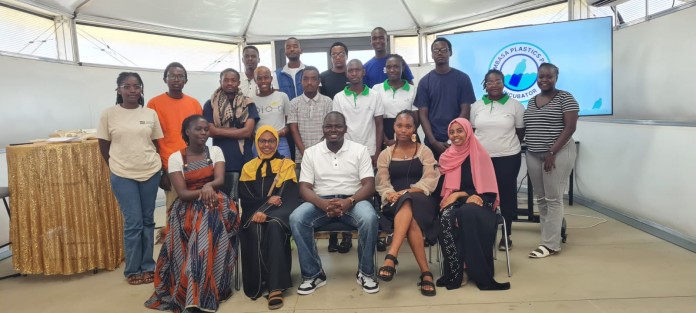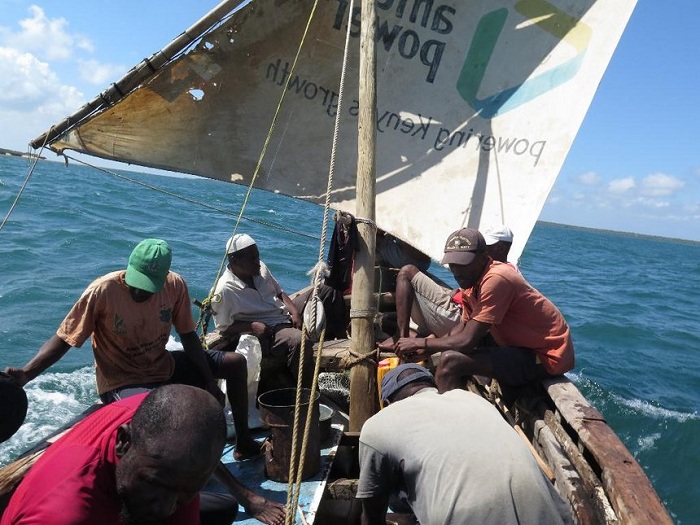
Mombasa Plastics Prize has unveiled phase two of the plastics challenge that will see nine teams from the first phase; including the three winners, get mentorship to bring their projects to fruition.
The second/incubator phase launched on Saturday at Ratna Square in Nyali will support the growth of young entrepreneurs to tackle plastic marine waste in Mombasa County.
Speaking during the launch of the incubator phase, Mombasa County Chief Sustainability Officer Basil Angaga said the program will help the county deal with marine waste, especially plastics.
“We have started the incubator phase to guide them to start and grow their businesses. Apart from helping in getting rid of marine waste, this will also help in dealing with the challenge of unemployment in the county,” said Angaga.
The second phase funded by USAID in partnership with Challenge Works, Close the Gap, SwahiliPot hub, and the Mombasa County government, will help the entrepreneurs develop and implement their working prototypes to be market-ready and increase the capabilities and skill sets of their teams among others.
“We started with the first phase where the teams pitched their ideas which then turned into a competition. Out of 15 teams, three emerged winners. We decided that just giving them money would not be very beneficial to the community, that is why we are having the incubator phase that will enable them to commence and sustain their businesses and projects,” said Angaga.
These teams will benefit from financial support and training, including mentoring, coaching, and training provided by expert partners from across Mombasa County.
“We are here to help entrepreneurs in Mombasa to close the gap. We bring services and support to these entrepreneurs to help them create their businesses in a more refined, sustainable, and investable point. We look at everything; from their financials to their products and even the way they carry themselves as individuals,” said Sidra Pasta, a Business Strategist and Coach at Close the Gap Kenya.
The teams selected to participate will formalize their businesses and establish their operational structure, refine their business ideas to generate sustainable and viable business plans, establish partnerships with the innovation ecosystem, and monitor and evaluate the impact of their solution on marine plastic waste pollution.
“I think there is huge potential in what they have innovated and what they have come up with in terms of concepts. They are solving not only problems in the blue economy but also taking that plastic waste that we find in our oceans and creating solutions for other businesses,” said Sidra Pasta.
“If you can create a desk out of plastic bottles that you have collected and there are kids studying on the floor without a desk, you are solving two problems at the same time. Those are actually the big wins that we are looking at,” she added.
The three winning teams from the initial phase of MPP: Twende Green Ecocycle, Plastic Taka Creatives, and Oceania Pacesetters will join Team Furies, Rafiki Peps, Team Boma, Eco-Print Generations, Plas-Tech, Eco-Building Solutions in the incubator phase that will run until April 2024.
Francis Aute, Head of Operation, Production, and Innovation at Plastic Taka Creatives says the incubator phase will help them deal with some of the challenges they are facing as a new business including knowing what licenses to apply for, getting buyers, coming up with business plans among others.
“They have experts and it will help us bridge the gap in terms of financials and understanding our business, having a sustainability plan so that when the grant money is depleted we are still able to continue running the business. I see it as a great opportunity,” said Aute.
Plastic Taka Creatives came in second in the initial phase, winning two million shillings.
“The biggest challenge innovators face is financing, even for those who won the grants the money is not enough to buy machines and set up crush plants. So through this incubator phase, we plan to solve some of those challenges including bringing in partners to invest in their businesses,” said Mary Gitary, Founder of Brandspark PR.
“Apart from financing, we will also help them refine their ideas to be attractive to investors,” she added.












